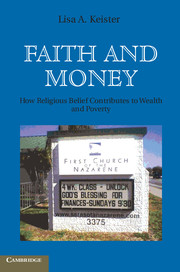1 - Religion and Wealth
Published online by Cambridge University Press: 05 June 2012
Summary
Wealth ownership is essential to financial security and general well-being. Wealth, or net worth, is total household assets less total liabilities. Wealth is relatively enduring – both within and across generations – and is related in some way to most other measures of achievement. For those who own it, wealth can have extraordinary advantages. It can enhance educational attainment, occupational opportunities, political power, and social influence. It provides a buffer against income interruptions, medical emergencies, and other crises such as accidents and natural disasters. Wealth can create more wealth when it is reinvested, and it can generate income in the form of interest or dividends. At high levels of wealth, the income it generates can make paid employment unnecessary. Yet even a small amount of savings can improve security, mitigate the effect of job loss and other financial shocks, and improve well-being dramatically. There are, of course, disadvantages of owning wealth as well, but most people agree that having wealth is more desirable than not having it.
- Type
- Chapter
- Information
- Faith and MoneyHow Religion Contributes to Wealth and Poverty, pp. 1 - 29Publisher: Cambridge University PressPrint publication year: 2011
- 2
- Cited by



